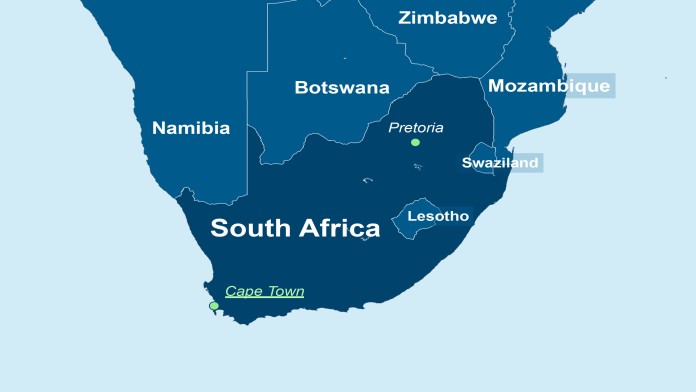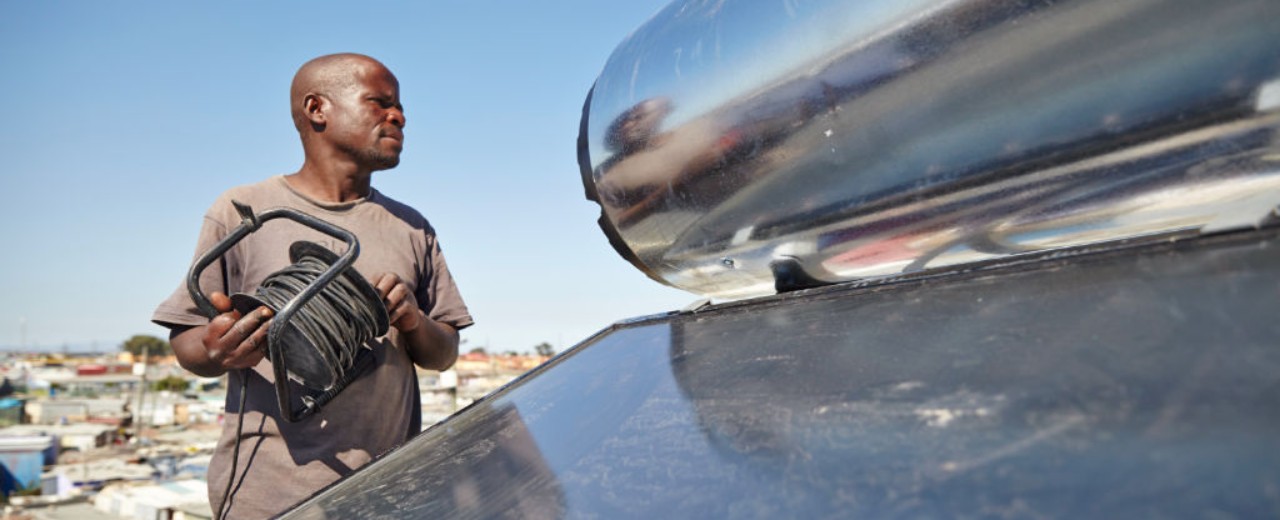
As of: 07/2025
South Africa’s electricity supply has been highly dependent on coal-fired power plants. These are associated with high levels of greenhouse gas emissions. The government has initiated reforms in this sector. In the future, much of the country’s energy will come from renewable sources. At the Climate Change Conference in Glasgow, Germany and the European Union, as well as other G7 donor countries pledged support for South Africa’s energy transition. On behalf of the German Federal Government, KfW is therefore working with GIZ to promote the expansion of renewable energies in South Africa, a socially responsible energy transition and the introduction of green hydrogen production on an industrial scale. This is Germany’s contribution to the Just Energy Transition Partnership (JETP) with South Africa.
South Africa has been heavily dependent on coal-fired power generation, with 80% of the country’s electricity being generated from coal. Low electricity prices have attracted energy-intensive companies but what once appeared to be an advantage is now a trap. Coal-fired power generation produces high levels of carbon dioxide emissions, as international comparisons show – South Africa is one of the world’s 17 highest emitters. In addition, outdated coal-fired power plants are prone to breakdowns, which can lead to hours of blackouts. All these factors have led to a rethink. The South African government wants to become less dependent on coal-fired electricity to meet its ambitious nationally determined contributions (NDCs) target of reducing emissions by 350 to 420 megatons of carbon dioxide equivalent by 2030.
Renewable energies, especially wind power and solar energy, will be significantly expanded. The transition initially threatens jobs in coal mining and power plants. Currently, 90,000 people in South Africa work in coal mining. Unemployment is very high at nearly 32% nationally, and even higher in the coal regions. This leads to social unrest.

Together with the European Union, France, the USA and the United Kingdom, Germany committed to a Just Energy Transition Partnership (JETP) with South Africa at the UN Climate Change Conference in Glasgow. Denmark and the Netherlands have also been added to the International Partners Group, while the USA withdrew from the JETP as part of its political shift. The common objective is to support a socially affordable energy transition in South Africa. As part of the JETP, up to USD 8.5 billion has been pledged to South Africa by 2027, mainly in the form of loans. The German Financial Cooperation (FC) makes a significant contribution to the implementation.
Specifically, the German FC supports the following areas:
1) Reforming South Africa’s energy sector – the gradual liberalisation of the electricity market
The objective of the reforms is to unbundle the state-owned ESKOM Group, establish an independent transmission system operator and align the energy supply with renewable energies. They include an amendment to the Electricity Regulation Act of 2006, which will also allow private providers to feed electricity from renewable energies into the grid in the future. This will result in increased competition within the energy market.
2) Expansion of grid infrastructure, renewable energies and increasing energy efficiency
A significant challenge in South Africa is that a large proportion of the land used to operate wind and solar power plants is located far from the economic centres where electricity is required. Therefore, a massive expansion of the grid is a prerequisite for the transformation of the energy industry. The mobilisation of private capital in renewable energies is another area of activity. Increasing energy efficiency plays an important role in demand management, e.g. in sewage treatment plants, which generally have the highest electricity consumption in municipalities.
3) Supporting the market ramp-up for green hydrogen
The energy transition also entails investigating the potential for hydrogen production. On behalf of the BMZ, KfW is financing a programme to develop a sustainable hydrogen economy in South Africa with funds from the German Federal Ministry for Economic Affairs and Energy (formerly Ministry for Economic Affairs and Climate Action). Pilot projects relating to the industrial production and use of green hydrogen are being supported. To date, the production of hydrogen has been more expensive than the generation of energy from fossil fuel sources of energy. Financial support for these projects is intended to improve their profitability. From Germany’s perspective, cooperation with South Africa in the production of green hydrogen could prove to be of strategic importance in terms of energy security.
4) Promoting vocational education and training
Using wind or solar power, for example, requires skilled workers. It is also important to equip the large number of young unemployed people with qualifications for a future-oriented labour market.
On behalf of the German Federal Government and in consultation with other donors, KfW supports reforms that will make a significant contribution to realising the UN 2030 Agenda for Sustainable Development by 2030. The German development cooperation support provided through KfW is aimed at achieving the ambitious South African climate targets and significantly reducing greenhouse gas emissions.
The electricity market is becoming more transparent. Energy security is increasing thanks to reforms, the expansion of renewable energies and the grid infrastructure, which is improving conditions for local companies. German and European companies are offering innovative, competitive solutions for the energy transition, which are being implemented in South Africa.
The pilot project for large-scale production of green hydrogen is a forward-looking initiative in terms of fossil fuel replacement. It has the potential to make hydrogen and its products marketable. South Africa could therefore play a significant role as a source of green hydrogen for the German and European markets in the future.
The programme financed by KfW helps to create jobs in renewable energy sources and to qualify specialists for the implementation of the energy transition.
The project contributes to the achievement of these following United Nations Sustainable Development Goals:
KfW Group
KfW Development Bank
Country sector Sub-Saharan Africa
Share page
To share the content of this page with your network, click on one of the icons below.
Note on data protection: When you share content, your personal data is transferred to the selected network.
Data protection
Alternatively, you can also copy the short link: https://www.kfw-entwicklungsbank.de/s/enzB1BXc
Copy link Link copied